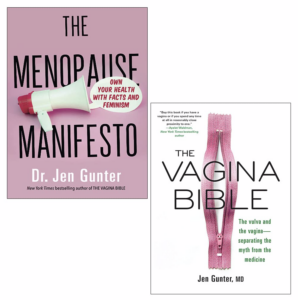Did your IC symptoms begin after using birth control, taking Lupron, after hysterectomy or as you aged? While many women assume that they have an incurable disease such as interstitial cystitis, Genitourinary Syndrome of Menopause (GSM) is a natural part of aging experienced by millions of women around the world. With proper treatment, symptoms can be dramatically reduced! There is hope.
Why does estrogen matter?
Estrogen plays a critical role in the health of your urinary and reproductive tracts. As estrogen levels fall, tissues become thinner, drier, and more easily irritated. This can trigger discomfort in the vagina (dryness, itching, burning, bleeding, painful intercourse), on the vulva (burning), in the urethra (burning) and the bladder (urinary urgency, frequency, incontinence and recurring UTI). These symptoms can significantly impact daily life, relationships and self-esteem.
How is GSM diagnosed?
A diagnosis is made via a visual examination of the skin by a healthcare provider. Characteristic signs of GSM are thinner, paler, inflamed and, often, easily torn skin. Providers may also perform vaginal pH tests, blood tests, and imaging to determine the extent of the condition. GSM is often a hidden cause severe pain and discomfort of the vulva, perineum and labia, aka vulvodynia. Urethral pain can be an early warning sign that GSM is occurring. Patients may feel urethral burning, discomfort and a sensation that there is a drop of urine stuck in the urethra.
If your urinary symptoms begin as you aged, after hysterectomy or even after the use of birth control, request an examination of your skin “down there” for estrogen atrophy. GSM is not a disease. It is a natural part of aging.
Treatment for GSM: Available Options and Side Effects
There are a variety of treatments for GSM that can improve the quality and health of the skin, including: hormone therapy, vaginal moisturizers, and lubricants. You should discuss the potential side effects of each treatment with your healthcare provider to weigh the benefits and risks before starting therapy. Concerns about cancer and cardiovascular with some types of hormone therapy are legitimate and require a frank conversation, particularly if you have a family history of estrogen driven cancers (breast, ovarian, uterine, etc.).
Hormone Therapy
Local (topical) estrogen therapy is the treatment of choice for GSM, usually in cream form (Estrace®, Premarin®, compounded estradiol) or as a vaginal insert (Vagifem®). Because skin creams are not absorbed in significant quantities into the blood stream, they carry much less risk of estrogen driven cancers and cardiovascular disease. In contrast, oral estrogen therapy is associated with an increased risk of blood clots, breast cancer, stroke and heart disease. Oral estrogen therapy is also not recommended for women over the age of 60.
Just as water can plump up a raisin, estrogen can rapidly improve the health and integrity of the skin. Some may experience burning when beginning topical treatment. This is common and normal in women with very dry skin and will resolve after a few weeks as the skin heals. Some brand name estrogen products (i.e. Premarin) have been known to cause some irritation due to preservatives in the formula. Many women are more comfortable with a preservative formula produced by a compounding pharmacy.
Some women may be particularly sensitive to estrogen and experience vaginal bleeding, breast tenderness, headaches and nausea.
 Vaginal Moisturizers & Lubricants
Vaginal Moisturizers & Lubricants
Moist skin is essential to the health of the the vulva, vagina, urethra and bladder. This mucus serves as a protective coating to the vulnerable tissues beneath it. As the skin atrophies, women may notice more sensitivity with soaps, laundry detergents and menstrual or incontinence pads. Even the passage of urine across the vulva can trigger intense burning, a clear sign that the skin lacks a protective coating.
There are a variety of products (V-magic, Coconut Oil) that can provide an extra layer of protection on the vulva. V-Magic closely matches the consistency of natural mucus and is made of organic olive, avocado and sea buckthorn oil. Organic, extra virgin coconut oil is also quite popular, especially for use at night. It does, however, penetrate through clothing and make for an embarrassing stain.
Vaginal moisturizers and lubricants are generally safe to use with minimal side effects though we urge you to look at the ingredients carefully. Avoid products that contain parabens, fragrances and alcohol which could cause irritation or allergic reactions.
Coping Strategies and Support Resources for Living with GSM
Living with GSM can be challenging, but there are coping strategies and support resources that can help women manage the symptoms and improve their quality of life.
Physical Health
Every woman faces a moment when they realize that aging isn’t a future event, that it’s happening right now. As we prepare for a healthy future, we often have to revisit how we live our daily lives. Exercise becomes all the more important with the onset of chronic illnesses, heart health and blood pressure woes. A simple daily walk can reduce blood pressure, control weight, help manage stress and, most importantly, produce endorphins, your body’s natural pain killers.
Kegel exercises may be helpful if you struggle with incontinence however they should be avoided if they are painful and/or if you struggle with tight pelvic floor muscles. Low-impact aerobic exercises such as walking, swimming, and cycling can help improve cardiovascular health and reduce stress. Gentle stretching exercises can help improve flexibility and alleviate pain associated with GSM. Yoga is a low-impact form of exercise that can help reduce stress, improve flexibility, and strengthen pelvic muscles. Strength training exercises, such as lifting weights, can help improve bone density and reduce the risk of osteoporosis, which is more common in women with GSM.
A diet rich in junk foods, sugar and artificial sugar, promotes weight gain, inflammation and chronic pain. For the woman with GSM, it’s important to feed our aging bodies good nutrition, a diet rich in vegetables, lean proteins, fruit and omega 3 fatty acids (fish, walnuts, and flaxseeds). Increasing fiber intake (i.e. Heather’s Tummy Fiber) is essential to promote healthy bowel movements. With aging, some women notice a reduced sensation of thirst, leaving them in a constant state of dehydration. Water intake is essential to flush urine and improve bowel movements. Alcohol, on the other hand, can be quite irritating to a tender bladder and urethra.
 Don’t be tempted by companies suggesting that you should “douche” or use a variety of “cleanses” to improve urinary and vaginal symptoms. Medical care providers generally say no to these products as they tend to be caustic and strip away the natural oils that help the skin. In her book the Vagina Bible, Dr. Jen Gunter says “Some of these washes claim that they can reduce bacterial vaginosis. They can’t. An external wash cannot possibly impact the inside of the vagina and washing internally with one of these products (some women do this – please don’t) could definitely increase your risk of B by killing good bacteria or irritating the vaginal mucosa.”
Don’t be tempted by companies suggesting that you should “douche” or use a variety of “cleanses” to improve urinary and vaginal symptoms. Medical care providers generally say no to these products as they tend to be caustic and strip away the natural oils that help the skin. In her book the Vagina Bible, Dr. Jen Gunter says “Some of these washes claim that they can reduce bacterial vaginosis. They can’t. An external wash cannot possibly impact the inside of the vagina and washing internally with one of these products (some women do this – please don’t) could definitely increase your risk of B by killing good bacteria or irritating the vaginal mucosa.”
Many patients tolerate Dove (unscented) for sensitive skin or Basis soaps though Dr. Gunter suggests looking for a product with a pH between 5.3 to 5.6 as more alkaline products can damage the skin. Cetaphile Restoderm, Eucerin Gentle Hydrating Cleanse were suggested. Do NOT use a product that contains fragrances. And, of course, if it’s irritates, don’t use it. Similarly, some wipes can also be quite irritating.
It is essential to speak with a healthcare provider before starting any new exercise or dietary changes, especially if you have any pre-existing medical conditions that may be affected. Nevertheless, adopting healthy nutritional and exercise habits can help manage GSM symptoms and improve overall health and well-being.
Mental Health
The symptoms of GSM can also significantly affect a woman’s self-esteem, sexuality, and relationships. Coping with GSM can be frustrating and overwhelming, leading to anxiety, depression, and social isolation. Support groups and online forums can offer a safe and supportive space for women to share their experiences, learn coping strategies, and receive encouragement and advice from others. These resources can offer a sense of community and connection to those living with GSM.
Mental health professionals can help women living with GSM manage the anxiety, depression, and stress associated with the condition. They can offer psychotherapy, cognitive-behavioral therapy, or other forms of emotional support to help women cope with the emotional impact of GSM effectively. Online therapy options have become increasingly available and popular for people with health concerns, lack of transportation, or time constraints.
Intimacy & Sexuality
One of the most challenging aspects of living with GSM is discussing the condition with romantic partners. Since it can be a sensitive topic, it is crucial to maintain open and honest communication to ensure that both partners feel comfortable and supported. Here are some tips for discussing GSM with a romantic partner:
- Choose the right time: Choose a time when you and your partner are relaxed, comfortable, and not distracted by other things. This allows for a focused conversation, and both parties are more likely to be receptive to the discussion.
- Frame the discussion positively: Approaching the conversation with a positive attitude can help generate a comfortable and supportive environment. Start by explaining the symptoms associated with GSM and the positive steps you are taking to manage it, such as seeking treatment, use of lubricants, and exercise.
- Be honest about how it affects you: Explain to your partner how GSM affects you physically and emotionally. Discuss how the condition impacts your sexual relationship and the sensations you experience.
- Discuss treatment and ways your partner can support you: Inform your partner about the treatment options available for GSM and how it can improve your symptoms. Discuss ways your partner can help you cope with the condition, such as being patient, using lubrication, or trying different sexual positions.
- Emphasize that the condition is common: Remind your partner that GSM is a common condition that affects many women, and it is not caused by anything either of you have done. This can help ease any feelings of guilt or anxiety your partner may have.
Honesty, openness, and positivity are fundamental to maintaining a healthy and trusting relationship while managing the symptoms of GSM. Women can speak to their support group or therapist about ways to have open conversations with partners about the condition.
Closing Thoughts
GSM is not your fault. GSM is not an incurable bladder disease. It is a common condition affecting women during and after menopause, caused by lower estrogen levels. Early diagnosis and treatment are essential to prevent the occurrence of other health conditions. Coping strategies and supportive resources are available to help women manage the symptoms and improve their quality of life. Women should communicate openly with healthcare providers and seek out these resources to receive the support they need.
If you need additional information, we recommend “The Menopause Manifesto” by Dr. Jennifer Gunter. This fabulous book is filled with tips, strategies and advice from a gynecologist who has dedicated her life to treating women’s health.

